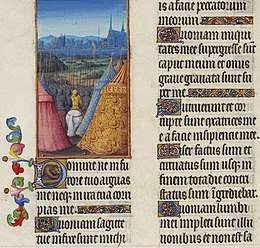Psalm 37
Psalm 37 is the 37th psalm of the Book of Psalms.[1][2][3][4][5] It has the form of an acrostic Hebrew poem, and is thought to have been written by David in his old age.[6]
| Psalm 37 | |
|---|---|
| "A psalm of David" | |
 Manuscript of Psalm 37 | |
| Other name | |
| Text | by David |
| Language | Hebrew (original) |
Interpretation
Psalm 37 is a response to the problem of evil, which the Old Testament often expresses as a question: why do the wicked prosper and the good suffer? The Psalm answers that the situation is only temporary. Catholicism sees, God will reverse things, rewarding the good and punishing the wicked here on earth.[7] This interpretation is shared by Protestants. Matthew Henry calls it David's call to patience and confidence in God by the state of the godly and the wicked.[8] Spurgeon calls it "The great riddle of the prosperity of the wicked and the affliction of the righteous".[9]
It is written as an acrostic and divided into discrete sections. Each section ends with God's resolution of the question.[6]
The psalm has also been understood as a prayer of the persecuted who has taken refuge in the temple or figuratively of refuge in God. The psalm concludes with a plea to God those who honor him, to bless them with his justice and to protect them from the snares of the wicked.[10]
The theme of inheriting the land reoccurs five times in this Psalm (in verse 9, 11, 22, 29 and 34). Prior to this in Psalm 25:13 the riches as also said to inherit the land as well. Barnes also compares the wicked being cut off in psalm 37:2 and 10 with the wicked being cut off in Pslam 73:27 [11]
Uses
Judaism
- Verse 21 is found in Pirkei Avot Chapter 2, no. 14.[12]
- Verse 25 is part of the final paragraph of Birkat Hamazon.[13]
New Testament
Verse 11 was cited by Jesus Christ in Matthew 5:5. The original reads,
- But the meek shall inherit the earth;
- and shall delight themselves in the abundance of peace.[14]
Islam
Psalm 37:29 "The righteous shall inherit the land, and dwell therein for ever" is referenced in the Qur'an:[15]
Before this We wrote in the Psalms, after the Message (given to Moses): "My servants the righteous, shall inherit the earth."
See also
References
- Commentaires sur les psaumes, d’Hilaire de Poitiers, (Paris, Éditions du Cerf, 2008), collection sources chrétiennes n°515,
- Commentaires of the Psalmes, by saint Johnn Chrysostome
- Discourse of the Psalmes, by Saint Augustin, vol.2,(Sagesses chrétiennes)
- Commentairy (jusqu’au psaume 54), by saint Thomas Aquinas, (Éditions du Cerf, 1273)
- Jean Calvin, Commentaire des psalmes, 1557
- Charles H. Spurgeon, Treasury of David (The Sword and the Trowel Magazine, 1885).
- Psalm 37 at USA Conference of Catholic Bishops.
- Matthew Henry’s Concise Commentary.
- Charles H. Spurgeon, Treasury of David (The Sword and the Trowel Magazine, 1885).
- Stuttgarter Erklärungsbibel. ISBN 3-438-01121-2, 2. Aufl. 1992, Deutsche Bibelgesellschaft Stuttgart, p.691f
- https://biblehub.com/commentaries/barnes/psalms/37.htm
- The Complete Artscroll Siddur page 555
- The Complete Artscroll Siddur page 195
- Psalm 37:11
- "Psalms - Oxford Islamic Studies Online". www.oxfordislamicstudies.com. Retrieved 2018-07-26.
- Quran 21:105 (Translated by Yusuf Ali)
External links
| Wikimedia Commons has media related to Psalm 37. |